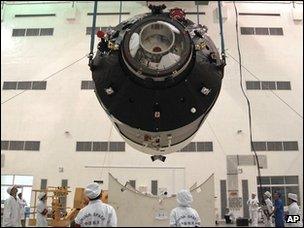Tiangong rocket: China media reacts to space launch
- Published

State media described the Tiangong-1 module as a "man-made heavenly palace"
Chinese state media have expressed pride at yesterday's successful launch of the Tiangong-1 space module, but the euphoria is not universally shared.
<link> <caption>The People's Daily</caption> <url href="http://paper.people.com.cn/rmrb/html/2011-09/30/nbs.D110000renmrb_01.htm" platform="highweb"/> </link> , a Communist Party mouthpiece, hailed the launch as a "complete success". That official view is echoed by thousands of web users, known in China as netizens.
But the success was overshadowed by a subway train collision in Shanghai just two days before, in which over 280 people were injured.
Several newspapers made comments contrasting the successful space launch with China's poor safety record in other sectors, and many netizens accused the government of prioritising a prestige project over public safety.
'Long live the motherland'
The space launch dominated Chinese state TV broadcasts and front-pages of state newspapers, which heaped praise on Tiangong, which means "heavenly palace" in Chinese.
"On this beautiful night, the Chinese nation declared: Tiangong is no longer a palace of the gods and no longer a distant dream, but a new starting point for the Chinese to stride towards the starry skies," said the <link> <caption>Liberation Army Daily</caption> <url href="http://www.chinamil.com.cn/jfjbmap/content/2011-09/30/content_68249.htm" platform="highweb"/> </link> , a paper run by the military.
Thousands of netizens praised the launch as yet another manifestation of China's growing technological prowess.
"Watching the launch, I feel the motherland is getting more and more powerful. Long live the motherland!" a netizen said on <link> <caption>Sina Weibo</caption> <url href="http://weibo.com/" platform="highweb"/> </link> , China's Twitter-like microblogging platform.
'Nothing to do with me'
But some people expressed reservations. One netizen dismissed the launch as "another prestige project that wastes manpower and money just for the National Day celebrations".
Tuesday's Shanghai subway accident and the high-speed railway crash in July still weigh heavily on people's minds.
"Tiangong launched successfully! Remarkable! But why can't you sort out the high-speed railway and the subway trains?" said one microblogger.
Another added: "The safest transport vehicle in China is the rocket!"
Many internet users appeared to be indifferent. "It has no direct connection with us ordinary folks. The only link is that it cost us money," said one microblogger.
An online poll on Sina Weibo asked users whether they felt proud of the launch. As of 11:00 GMT on Friday, 40% of the 4,288 respondents answered Yes, while 47% clicked the response: "It's got nothing to do with me."
The public sentiment was subtly reflected in some newspaper commentaries.
<link> <caption>The Beijing News</caption> <url href="http://epaper.bjnews.com.cn/html/2011-09/30/content_281644.htm?div=-1" platform="highweb"/> </link> suggested that government departments and businesses learn from the successful space project in order to reduce product quality problems and public safety accidents.
<link> <caption>Guangming Daily</caption> <url href="http://guancha.gmw.cn/2011-09/30/content_2722374.htm" platform="highweb"/> </link> said: "We should take care of our lives the same way as we take care of Tiangong-1" because after all "both aerospace developments and economic progress are intended to improve people's lives".
<link> <caption> ┤¾¤¾┤½├¢ Monitoring</caption> <url href="http://www.monitor.bbc.co.uk/" platform="highweb"/> </link> <italic> selects and translates news from radio, television, press, news agencies and the internet from 150 countries in more than 70 languages. It is based in Caversham, UK, and has several bureaus abroad.</italic>
- Published29 September 2011